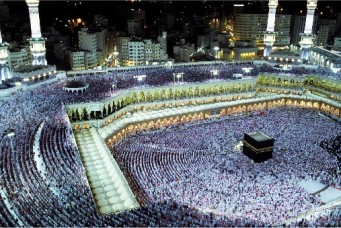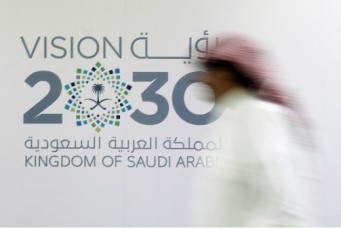Saudi Arabia’s Struggle for Sunni Leadership
Recent changes to Saudi religious institutions are not a sign of wider reform but an indication of the struggle to redefine Saudi Arabia’s religious character.
Saudi Arabia’s decision to limit the authority of the Committee for the Promotion of Virtue and the Prevention of Vice (CPVPV)—barring it from chasing, arresting, or interrogating suspects—was positively welcomed by commentators as an attempt “to respond to [public] grievances.” In response to gross violations committed by members of CPVPV, locals have called repeatedly to reform the institution, for example suggesting checking its authority by developing a protocol to describe the specific public offenses that are considered vices. Though there have been small-scale reforms in the last few years, such as asking members of CPVPV to wear badges and refrain from verbal or physical violence, no serious reforms had been enacted. Even the April decision only revoked the publicly visible roles of CPVPV while maintaining its role of public surveillance, including online surveillance. Calls for reforming the institution are drowned by the evident political need to keep this vast and pervasive institution functional.
The timing of this reform was synchronized with the release of the National Transformation Plan 2020 (NTP), which advances Saudi Vision 2030. The grand plan, released in April 2016, aims to increase non-oil based revenues, grow the private sector, and promote tourism and foreign investment. In part, the reforms were meant to address any concerns about CPVPV public arrests by the CPVPV impacting foreign businesses’ decisions to be based in Saudi Arabia, but it also points to the bigger issue of the kingdom’s attempts to rethink and reform its Islamic identity into a more moderate, tolerant one. This could be needed partly to foster a safe and inviting local environment for foreign investors, but more importantly to distance the Saudi version of Islam from any resemblance to that of Islamist insurgencies, which are constantly competing with the Saudi state over whose vision of an Islamic state is more “authentic.”
The intent and scope of religious reforms in Saudi Arabia have often been enigmatic; they can never be easily evaluated as long as religion remains a political tool for changing ends. To reassure its Western allies in the post-9/11 era, the kingdom initiated a series of religious reforms between 2003 and 2006. These included developing a national counterterrorism program to target religious extremists, funded by millions of dollars from the United Nations; establishing an interfaith international dialogue center, a local national dialogue center, a co-ed higher educational facility, and a national anti-terrorism counseling center; and including scholars of other Sunni schools of thought in the Hanbali-dominated Council of Senior Scholars. An informal agreement between top U.S. and Saudi officials to reform religious educational textbooks in 2005 also ascribed the authority to declare jihad only to the king, based on his role as the custodian of the two holy mosques. The king is portrayed as the legitimate leader of the state, and those who defy his orders—whether by protesting or publically expressing dissent—are sinful. Though these textbook changes also included some references to Islam as a religion of peace to all mankind, elements of historical intolerance to Jews and Christians as well as certain Islamic sects or schools of thought can still be found, according to a 2013 U.S. State Department study.
However, reforms to ensure genuine religious freedom and practice, even if relative, have not been substantial enough. A set of laws and decrees were enacted in 2014 to protect the prerogative of the king and the supreme scholars to monopolize religion. For instance, the anti-terror law of January 31, 2014 considers atheism an act of terror. Royal decree 44, issued on February 3, 2014, criminalizes having a religious affiliation to certain groups—such as the Houthis and the Muslim Brotherhood, as well as al-Qaeda and other Islamist insurgencies—or promoting “atheistic ideologies” and casting “doubt on the fundamentals of Islam” (which, naturally, are to be defined by the Saudi authorities). In addition, the religiously based legal system started to use the new laws to sentence individuals for posting critical or controversial views of Islam online. For instance, the court statement issued against journalist Alaa Brinji cited tweets in which he supported the “women to drive” campaign and the release of political prisoners as evidence he deviated from the state’s religious approach and ridiculed its religious scholars. Such laws became the way the state enforces its definition of religion and secures its dominance. Politically unwanted groups or individuals are actively rooted out either as deviants or religious extremists, and the state has the sole authority over religion.
Saudi Arabia’s attempts to counter Iranian regional influence have also intensified the competition over religious domination. In August, a league of over one hundred Yemeni Sunni scholars convened in Riyadh under the patronage of the Saudi Ministry of Islamic Affairs and issued an agreement on Islamic ethics that aimed to cut Iranian access to Yemen through its associated religious and ideological schools of thought. Sheikh Abulhassan Mustafa Al-Sulayman, the head of the drafting committee, further declared that because elements of the agreement are inspired by the Quran and Sunnah, it was mandatory for Yemeni Islamic scholars to sign it. He added that the agreement, though aimed to be inclusive, is not intended in any way to mend bridges with rafida, a term often used by Salafists to denounce Shia, because they are “bloody, exclusionary, enemies of security and stability who corrupt any country, in addition to their deviance from Sunni doctrine and their dark, black history with Sunnis, Muslim countries, and all Muslims.” He declared that all Muslims—including Sufis and Zaidis, the Houthis’ religious affiliation—are welcome to sign the charter, clearly leaving the door slightly open for Houthis to join the pact as “repentant” subordinates under Sunni patronage.
As Saudi Arabia tries to redefine its Salafi religious narrative according to its political needs, other countries, weary of Salafis’ growing influence, seem to counter those efforts. A recent conference held August 25-26 in Grozny, Chechnya, aimed to redefine “Who are Ahl Al-Sunnah Wal-Jamaah?” (the Sunni people). The UAE-based Tabah foundation, which organized the conference, described it as a necessary effort at a time when there are “attempts to hijack the designation ‘Ahl Al-Sunnah Wal-Jamaah’ by groups of Kharijites, renegades, and abusers of Sharia, who are exploiting their faulty practices to tarnish the image of Islam.” More than two hundred Islamic scholars of various Sunni schools of thought participated, including Ali Gomaa, the previous Grand Mufti of Al-Azhar. Their concluding remarks included all self-identifying Sunni groups in their definition except the Salafis and, by extension, the Wahhabis, the dominant religious group of Saudi Arabia. The statement indirectly criticized Saudi Salafism for sectarian violence and religious intolerance in excluding the Sunni groups that are not in accordance with state Salafism. As expected, a torrent of condemnation followed from Saudi Arabia’s supreme scholars—as well as Salafis, the Muslim Brotherhood, and Al-Azhar—for what they perceived as Russian meddling in regional politics via religion, Egyptian scholars’ betrayal of their Saudi funders, and the implied condemnation of Salafis as Kharijites, or deviants.
Saudi Arabia has based its 2030 vision in its historical position as the birthplace of Islam, and therefore as a perceived leader of the Sunni Islamic world. Decades of investment in religious institutions and constituencies, both local and international, heavily influenced and enforced that identity. It is unlikely that a deeper religious reform will take place if it contradicts Saudi Arabia’s envisioned Sunni leadership role, particularly while the regional sectarian divide continues to fuel the kingdom’s political ambitions. Piecemeal religious reforms will be the most likely approach to neutralize temporary political threats, develop a business-friendly environment, and rebrand the decades-long religious identity of the state.
This article is reprinted with permission from Sada. It can be accessed online here.
Hala Al-Dosari is a Saudi writer and a visiting scholar at the Arab Gulf Institute in Washington.
Subscribe to Our Newsletter





